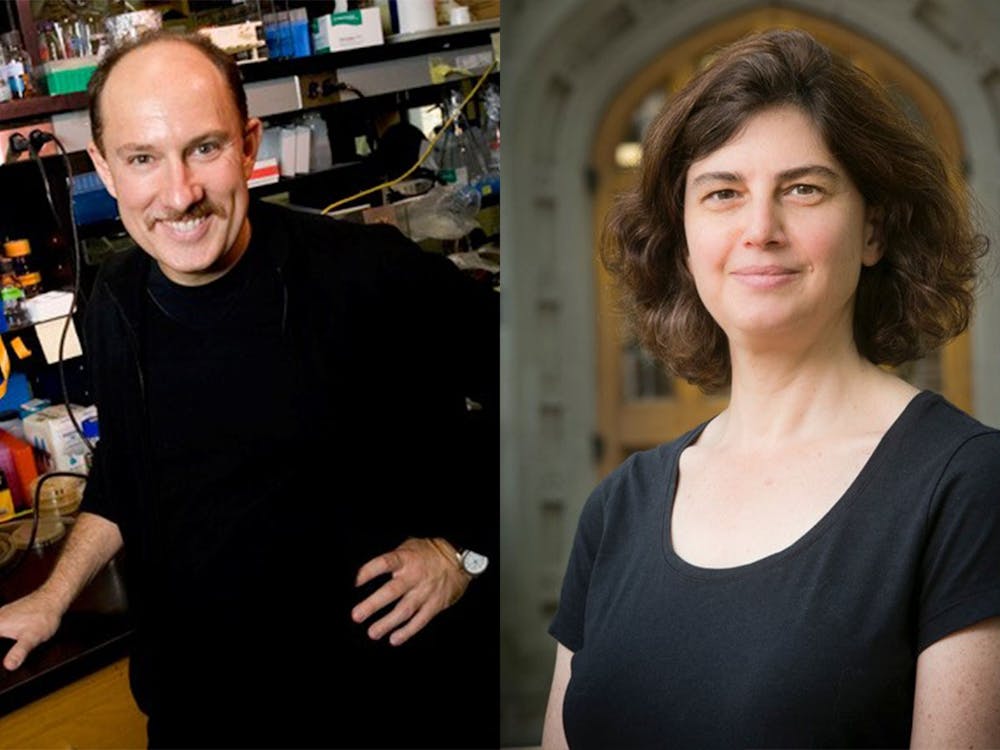Two Duke professors have been elected to the National Academy of Sciences, which announced this year’s cohort of new members last Monday. They will join the ranks of 2,461 of the country’s leading researchers.
Rachel Kranton, the James B. Duke distinguished professor of economics and dean of social sciences in the Trinity College of Arts & Sciences, and Joseph Heitman, the James B. Duke professor and chair of the department of molecular genetics and microbiology in the Duke University School of Medicine, are two out of the 120 new members elected into the NAS this year. Election to the NAS is considered one of the highest honors in a scientific career.
One of Kranton’s two central research interests is the interplay between social identity and economic decision making. As examples of this connection, Kranton cited the influence of gender on job choice and the impact of one’s position within an institutional hierarchy on work ethic.
Kranton’s second major area of focus is the intersection between social networks and economics transactions.
“A simple example of that concept would be how who you meet in college and who your friends are can be important for what you study, how you ultimately find a job, and that still impacts you later in your job trajectory,” Kranton said.
Kranton’s most recent work has focused on economic experiments. In particular, she is trying to understand how identity influences certain types of decisions. In a September 2020 paper, Kranton and her colleagues showed that certain individuals have “groupy” tendencies, meaning that their social preferences change in the context of different social groups.
“What we actually discovered is that there are some people who will treat people differently no matter which group they’re in. And there are some people who don’t behave that way at all,” Kranton said.
Kranton explained that one of her goals as Trinity’s dean of social sciences is to spread awareness about the broad scope of the field of economics.
“Economics speaks to so many different realms of our lives. A tiny corner of it is about money and banking—maybe 10% of it is about money and banking, and the other 90% is about other issues, including issues such as inequality,” Kranton said, adding that “economics is an incredibly broad field.”
Heitman’s work falls within the fields of microbiology and genetics. In one of his major achievements, he worked on the discovery of targets for rapamycin, an FDA-approved immunosuppressant drug that is used in cardiology, oncology and transplant medicine.
At Duke, much of Heitman’s work has focused on the invasive fungus Cryptococcus, which he has now been studying for nearly three decades. The fungus causes potentially fatal infections of the central nervous system.
Through this research, Heitman and his colleagues discovered that cryptococcus cells can undergo a sexual cycle that doesn’t necessitate a partner of the opposite mating type. This type of sexual cycle is now called unisexual reproduction.
Most recently, Heitman’s research has focused on a novel kind of drug resistance called epi mutation in which a microbe’s genes can be silenced through an RNA silencing pathway, causing mutant-like behavior, without any change in the DNA sequence.
Both professors have extensive research and administrative duties at the University, and Kranton also teaches courses at both the graduate and undergraduate levels.
Kranton, who frequently teaches the undergraduate course Economics 205: Intermediate Microeconomics II, said that she “absolutely [loves] teaching” core classes.
“Teaching is incredibly rewarding in the sense that I hope I am providing a way of thinking or perhaps a different perspective on a wide range of problems,” she said. “I think economics is this incredibly powerful framework.”
Heitman said that while he misses teaching, one of his favorite parts of his administrative roles is faculty recruitment.
“It’s just so exciting when new faculty arrive, and you get to learn about their program and kind of live vicariously through what they’re discovering in their labs. That’s been really, really thrilling,” he said.
Both Heitman and Kranton said that they are honored by and excited about their elections to the NAS. While this year’s meeting was virtual, they both hope that the April 2022 meeting will be held in-person at the Academy’s headquarters in Washington, D.C.
Heitman explained that while the election will likely lead to work on various committees and publication in the organization’s journal, he is particularly excited to be able to nominate colleagues for election into the Academy.
“There’s really an opportunity to be an advocate for other colleagues who deserve recognition,” Heitman said.
Get The Chronicle straight to your inbox
Signup for our weekly newsletter. Cancel at any time.

Anna Zolotor is a Trinity senior and recruitment chair for The Chronicle's 118th volume. She was previously news editor for Volume 117.

